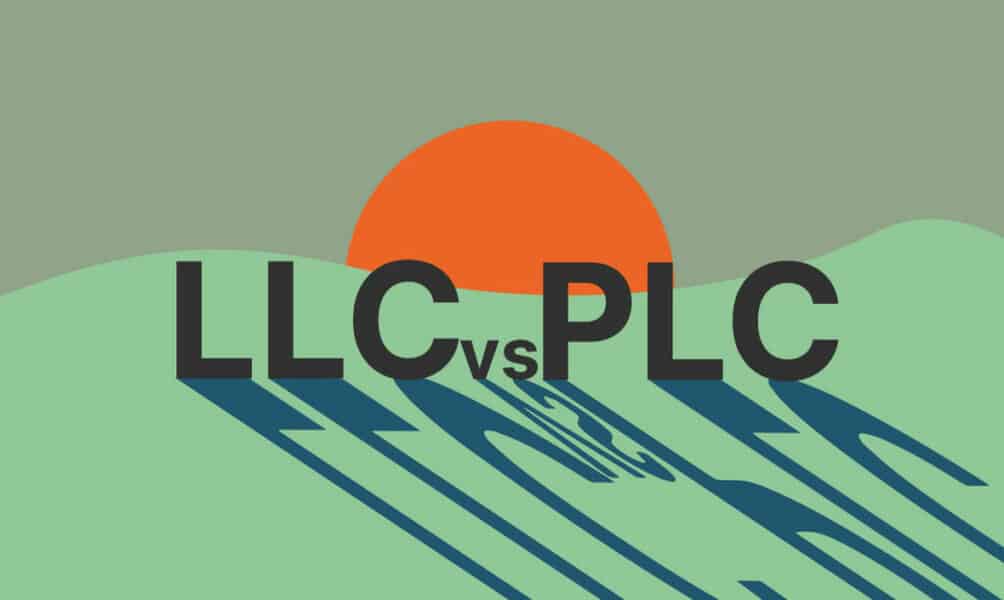If you’re starting an LLC, the business entity formation process is one of the first and most important hurdles. This step can be terribly complex ...
LLC vs PLC: What is the Difference?
Written by: Carolyn Young
Carolyn Young is a business writer who focuses on entrepreneurial concepts and the business formation. She has over 25 years of experience in business roles, and has authored several entrepreneurship textbooks.
Edited by: David Lepeska
David has been writing and learning about business, finance and globalization for a quarter-century, starting with a small New York consulting firm in the 1990s.
Published on February 15, 2022

When starting a business, one of the most important decisions you’ll make is what type of business entity to form. You’ve probably heard of a limited liability company (LLC) and maybe you’ve heard the term public limited company (PLC) as well. These are two types of entities, and it’s important to know the difference.
What Is an LLC?
An LLC is an increasingly popular business structure for startups, offering liability protection for ownership and greater flexibility than a corporation, particularly in terms of taxes. The LLC itself does not pay taxes. As a “pass-through” entity, income passes through the business to the owner or owners, who report it on their personal tax returns. An LLC is created by filing paperwork with your state, and nominal fees are involved.
An LLC offers its owner or owners, who are called members, considerable flexibility in terms of management. You can choose your management and operational structure and decide how you want to be taxed. Your LLC can have a single member or multiple members, all of whom have personal liability protection, meaning your personal assets are not at risk if you cannot pay business debts or are involved in a lawsuit.
LLCs are the most common type of business entity in the US and the United Kingdom (UK).
What Is a PLC and How Is It Different from an LLC?
A PLC is a public company in the UK that is very similar to a US corporation. A PLC must have “PLC” in its business name just as a US corporation must have “Inc.” in its name. Unlike an LLC, a PLC is a company that has issued shares of stock to the public, and whose shareholders have limited personal liability just as corporation shareholders or LLC members do.
A PLC is subject to UK regulations and must have annual meetings and issue periodic reports to shareholders, and they are governed by a board of directors. This is also true of corporations in the US, but not of LLCs. PLC regulations, however, are much stricter than corporation regulations.
PLCs must have at least two shareholders and must have minimum capital of £50,000.
All companies listed on the London Stock Exchange are PLCs.
Taxation Differences Between PLCs and LLCs
Under UK law, PLCs pay corporate taxes at the current tax rate of 20%. Shareholders of the PLC may also have to pay taxes on dividends received. This is very similar to corporations in the US.
LLCs are unique in terms of taxation as their owners have a choice about how the company will be taxed. By default, an LLC is taxed like a sole proprietorship if it has one member and a partnership if it has more than one member.
In both cases, business income “passes through” to the members, who report profits and losses on their individual tax returns. The LLC itself is not taxed, which simplifies the process for members. Also, losses and operating costs of the business can be deducted personally by the members. Taxes are paid at the personal tax rate of the members, although the owners may also have to pay self-employment taxes.
Note that a multi-member LLC must also file form 1065 with the IRS, which is the U.S. Return of Partnership Income. Attached to this will be form K-1s for each member showing their share of the business income.
But LLCs owners can instead choose to be taxed as a corporation. To do so, the LLC must file a document, referred to as an election, with the IRS. The LLC must then decide if it wishes to be taxed as an S corporation or a C corporation.
C-Corp status means profits are taxed at the current rate for corporations (21% as of early 2022), which is significantly lower than the typical individual taxpayer rate. But keep in mind, C-Corp shareholders, which includes members, must also pay taxes on their distributions (but not self-employment taxes). Thus, the C-Corp is subject to what is sometimes referred to as double taxation.
As with sole proprietorship and partnership status, S-Corp taxation considers the LLC a pass-through entity, which means income passes through the company and into the hands of the owners. At this point, taxes are applied at the same rate as those of individual taxpayers.
S-Corps use Form 1120S to file their taxes, which is used to report the income, losses, and dividends of S-Corp shareholders. S-Corp shareholders do not pay self-employment taxes, which is the primary advantage of S-Corp status compared to sole proprietorship or partnership.
Generally, S-Corp tax status is beneficial if the company is profitable enough to pay the owners a salary and at least $10,000 in annual distributions so the owners can be taxed as employees and not pay self-employment taxes. It costs more to run an S-Corp than an LLC due to additional bookkeeping and payroll expenses. Thus, the tax benefits should be more than the additional costs for an S-Corp status to make financial sense.
In Closing
As you can see, LLCs and PLCs are very different. If you’re doing business in the U.S., a PLC is not an option for you, but an LLC is. LLCs have many benefits and are simple to form.
Subscribe to Our Newsletter
and gain insider access to cutting-edge business insights and trends.
Featured Resources

10 Best LLC Formation Services
Published on August 22, 2022
Read Now

LTD vs LLC: What Is the Difference?
Published on February 16, 2022
If you’re starting a company, you may have heard of various business structures you might choose, such as a limited liability company (LLC).Yo ...
Read Now

How are Profits Split in an LLC?
Published on February 9, 2022
If you’re forming a limited liability company (LLC) with other members, it’s vitally important that you understand how profits and losses areall ...
Read Now
Comments